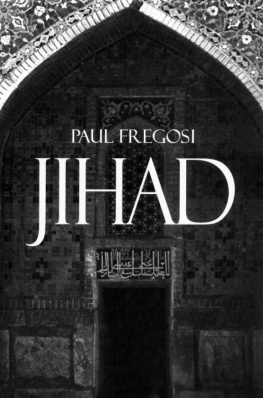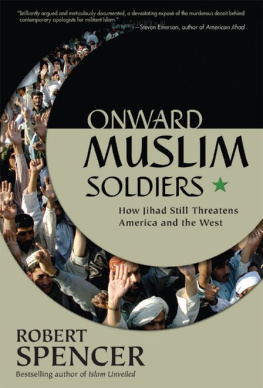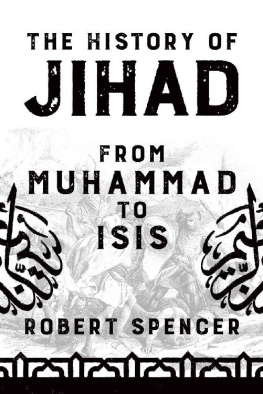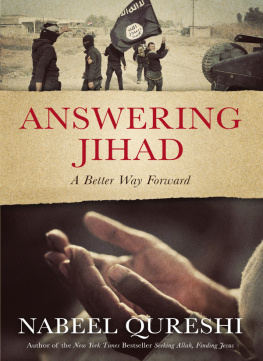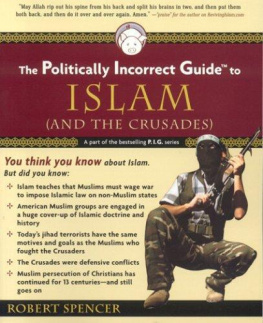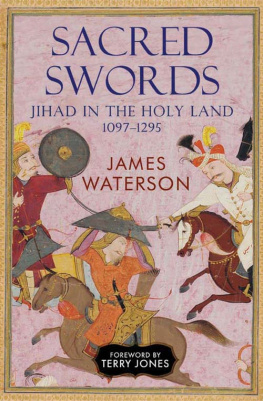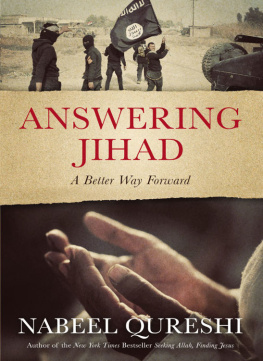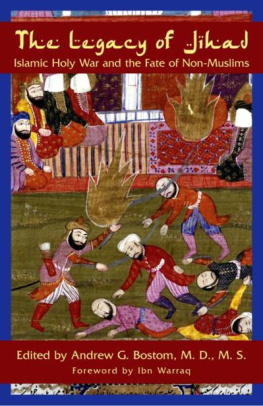Paul Fregosi - Jihad in the West: Muslim Conquests from the 7th to the 21st Centuries
Here you can read online Paul Fregosi - Jihad in the West: Muslim Conquests from the 7th to the 21st Centuries full text of the book (entire story) in english for free. Download pdf and epub, get meaning, cover and reviews about this ebook. year: 2009, genre: History. Description of the work, (preface) as well as reviews are available. Best literature library LitArk.com created for fans of good reading and offers a wide selection of genres:
Romance novel
Science fiction
Adventure
Detective
Science
History
Home and family
Prose
Art
Politics
Computer
Non-fiction
Religion
Business
Children
Humor
Choose a favorite category and find really read worthwhile books. Enjoy immersion in the world of imagination, feel the emotions of the characters or learn something new for yourself, make an fascinating discovery.
- Book:Jihad in the West: Muslim Conquests from the 7th to the 21st Centuries
- Author:
- Genre:
- Year:2009
- Rating:3 / 5
- Favourites:Add to favourites
- Your mark:
- 60
- 1
- 2
- 3
- 4
- 5
Jihad in the West: Muslim Conquests from the 7th to the 21st Centuries: summary, description and annotation
We offer to read an annotation, description, summary or preface (depends on what the author of the book "Jihad in the West: Muslim Conquests from the 7th to the 21st Centuries" wrote himself). If you haven't found the necessary information about the book — write in the comments, we will try to find it.
Paul Fregosi: author's other books
Who wrote Jihad in the West: Muslim Conquests from the 7th to the 21st Centuries? Find out the surname, the name of the author of the book and a list of all author's works by series.
Jihad in the West: Muslim Conquests from the 7th to the 21st Centuries — read online for free the complete book (whole text) full work
Below is the text of the book, divided by pages. System saving the place of the last page read, allows you to conveniently read the book "Jihad in the West: Muslim Conquests from the 7th to the 21st Centuries" online for free, without having to search again every time where you left off. Put a bookmark, and you can go to the page where you finished reading at any time.
Font size:
Interval:
Bookmark:

PAUL FREGOSI
FROM THE
7TH TO THE 21ST CENTURIES

 DEDICATE THIS BOOK TO the memory of Bosko Brcik, 25, Christian Serb, and of his bride-to-be Admira Ismic, 25, Bosnian Muslim, who were shot and killed by an unknown sniper as they tried to escape from the beleaguered city of Sarajevo on May 20, 1993, and who died in each other's arms on the banks of the Miljacka River. God be with them.
DEDICATE THIS BOOK TO the memory of Bosko Brcik, 25, Christian Serb, and of his bride-to-be Admira Ismic, 25, Bosnian Muslim, who were shot and killed by an unknown sniper as they tried to escape from the beleaguered city of Sarajevo on May 20, 1993, and who died in each other's arms on the banks of the Miljacka River. God be with them.
PART I. THE DAYS OF THE PROPHET
PART II. BEYOND ARABIA
PART III. THE IBERIAN VENTURE
PART IV. ISLAM UNFOLDS
PART V. FOR SPAIN, MY HUMBLE DUTY
PART VI. DEFLECTION IN THE SOUTH
PART VII. ONSLAUGHT FROM THE EAST
PART VIII. BY LAND AND SEA
PART IX. THE WANING OF HOLY WAR
PART X. WARRIORS OF A WILLING DOOM
PART XI. THE JIHAD RETURNS
AND TURKISH TERMS
AL-ANDALUS. The part of Spain under Muslim rule. Its frontier fluctuated with the fortunes of war.
ALMOHAD. Berber dynasty (1130-1269) which followed a policy of religious purity and was defeated in Spain in 1212.
ALMORAVIDS. Berber dynasty from the Sahara which ruled over much of Morocco and Spain in the eleventh and twelfth centuries.
ANSAR. Inhabitants of Medina who helped Muhammad and the early Muslims after they moved from Mecca to Medina in the year 622.
BURAQ. The animal with the body of a mule and the head of a woman that carried Muhammad from Mecca to Paradise through Jerusalem on the Night Journey in the year 619.
CALIPH. Successor to Muhammad as head of the Muslim (Sunni) community. The caliphate (which was based in Istanbul) was abolished by Kemal Ataturk in 1924.
DAR-AL-HARB. The Land or Domain of War, where Islamic rule does not reign and which has historically been considered a legitimate target for the Jihad.
DAR-AL-ISLAM. The Land or Domain of Islam, where Islamic law and rule prevail.
DHIMMI. A nonbeliever (notably Jews, Christians, and Zoroastrians) who lives on Muslim territory, under Islamic law and protection. In lands under the rule of the Ottoman Turks dhimmis were known as rayahs.
FATWA. A religious or judicial edict that can be passed by the caliph, a mufti, or a judge (qadi).
GHAZI (Turkish term). A fighter for the faith engaged in a Jihad against the infidels.
HADITHS. The most holy of Muslim books after the Koran, usually translated as "The Traditions." The practices, utterances, and events of Muhammad's life. They number many thousands, were assembled by a number of official collectors several decades (usually one to two hundred years) after the Prophet's death, and many are considered historically suspect.
HEJIRA (or HIJRA). The emigration in 622 of Muhammad and his first disciples to Medina from Mecca, where they were unwanted and subjected to abuse. This event marks the beginning of the Muslim calendar.
IMAM. The leader of a Muslim religious community. Also among the Shiites, Ali and his descendants, who are considered the legitimate Leaders of Islam.
KAFIR. Infidel who has deliberately rejected the message of Islam.
KORAN (often spelled QURAN). The Muslim holy book revealed to Muhammad by God through the Angel Gabriel during a number of appearances in Mecca and Medina.
KOREISH (also spelled QURAISH). Influential Mecca tribe to whose minor branch Muhammad belonged and who at first opposed the founding of Islam and fought the new faith.
MAHDI. For the Sunnis, the awaited Messiah. The Shiites await, however, the Twelfth Iman.
MALIKI. A disciple of Malik, an eighth-century scholar who propounded the Maliki austere school of Islam, particularly strong in North Africa and among the Almoravids.
MAWALI. Non-Arab convert to Islam.
MILLET. A non-Muslim religious community living in Islam.
MORISCOS. Muslims in Christian Spain, mainly Castile, who had on the surface accepted Christianity but continued to practice secretly their Muslim faith.
MOSLEMAH. The Muslim nation in its entirety.
MOZARABS. Spanish Christians living in Muslim al-Andalus. They retained their Catholic faith but their everyday language and culture were Arabic.
MUDEJARES. Muslims who lived and worked in Christian Spain.
MUEZZIN. The person who calls the faithful to prayer in a mosque.
MUHAJIRUN. The Meccan followers of Muhammad who moved to Medina with the Prophet at the time of the hejira. The word means "emigrant."
MUFTI. Religious expert on the sharia, the Muslim law.
MUJAHID. Warrior of Islam engaged in a Jihad.
MUWALLADS. Native Spanish Muslims in al-Andalus, as opposed to those of Arab or Moorish stock.
QADI. A judge who administers Muslim law.
QURAN. See KORAN.
RAYAH. See DHIMMI.
SHARIA. The laws of Islam which originate in the Koran and the Hadiths.
SURA. A chapter in the Koran. There are 114 in all, each of which contains a number of verses.
TAIFA. One of the numerous minor Muslim kingdoms, usually centered in a town, which made up the Muslim Spanish state of al-Andalus during much of its 800-year history. The main taifas were Cordova, Seville, Toledo, and Granada.
ULAMA. A learned Muslim religious functionary.
UMMA. The Muslim community.
VIZIER. The Ottoman Sultan's chief minister and war leader.
 HE JIHAD HAS HAD A long presence on our planet, going back to the early 600s, when Muhammad preached the Koran, ruled over Medina, and sent his followers to fight against the pagan Arab tribes of the peninsula, demanding they acknowledge his suzerainty and convert to Islam. The terrorism called Jihad we know today is linked, even if only by name, with these Muslim holy wars which began more than 1,300 years ago in Arabia and spread during the next 13 centuries to the Middle East, Europe, Africa, and Asia, and which are now also part of the North and South American scene. The military conflicts of former centuries, which all Muslims called the Jihad, and the terrorist campaigns of recent decades, which some extremists consider a Jihad also, not only share the same name. They are also an expression of the distaste and basic antagonism which Islam has always manifested toward the non-Muslim world, be it atheist, pagan, Hindu, Sikh, Zoroastrian, Jewish, Buddhist, or Christian, and has often shown it by fighting it-through the Jihad. We had forgotten this fact of interna-. tional life, for most Muslim countries during the past century and a half were politically impotent, ruled mainly as colonies or protectorates of Britain, France, Italy, Spain, and Holland. They all regained their sovereignty late in the twentieth century. Recent events have reminded us of their existence and of their independence. Islam is back.
HE JIHAD HAS HAD A long presence on our planet, going back to the early 600s, when Muhammad preached the Koran, ruled over Medina, and sent his followers to fight against the pagan Arab tribes of the peninsula, demanding they acknowledge his suzerainty and convert to Islam. The terrorism called Jihad we know today is linked, even if only by name, with these Muslim holy wars which began more than 1,300 years ago in Arabia and spread during the next 13 centuries to the Middle East, Europe, Africa, and Asia, and which are now also part of the North and South American scene. The military conflicts of former centuries, which all Muslims called the Jihad, and the terrorist campaigns of recent decades, which some extremists consider a Jihad also, not only share the same name. They are also an expression of the distaste and basic antagonism which Islam has always manifested toward the non-Muslim world, be it atheist, pagan, Hindu, Sikh, Zoroastrian, Jewish, Buddhist, or Christian, and has often shown it by fighting it-through the Jihad. We had forgotten this fact of interna-. tional life, for most Muslim countries during the past century and a half were politically impotent, ruled mainly as colonies or protectorates of Britain, France, Italy, Spain, and Holland. They all regained their sovereignty late in the twentieth century. Recent events have reminded us of their existence and of their independence. Islam is back.
Font size:
Interval:
Bookmark:
Similar books «Jihad in the West: Muslim Conquests from the 7th to the 21st Centuries»
Look at similar books to Jihad in the West: Muslim Conquests from the 7th to the 21st Centuries. We have selected literature similar in name and meaning in the hope of providing readers with more options to find new, interesting, not yet read works.
Discussion, reviews of the book Jihad in the West: Muslim Conquests from the 7th to the 21st Centuries and just readers' own opinions. Leave your comments, write what you think about the work, its meaning or the main characters. Specify what exactly you liked and what you didn't like, and why you think so.

